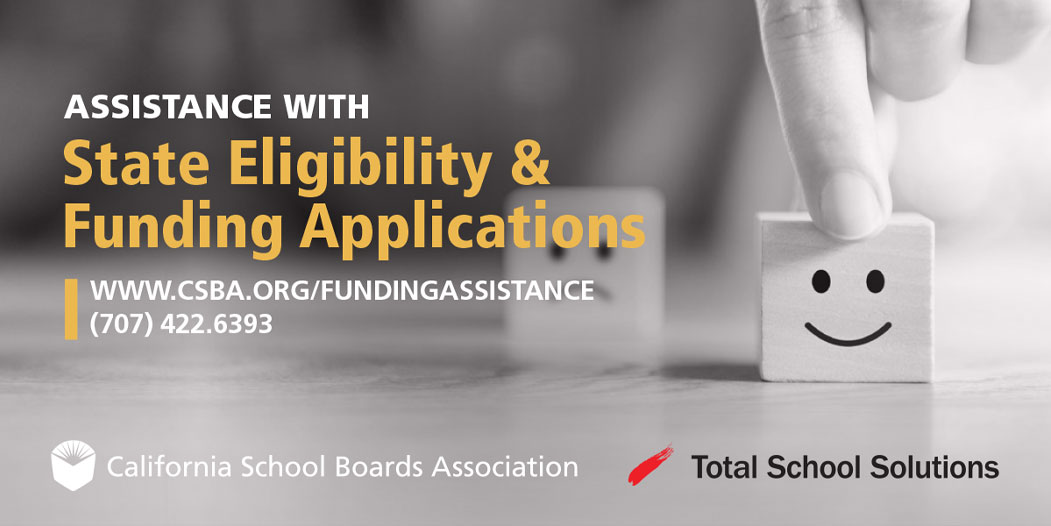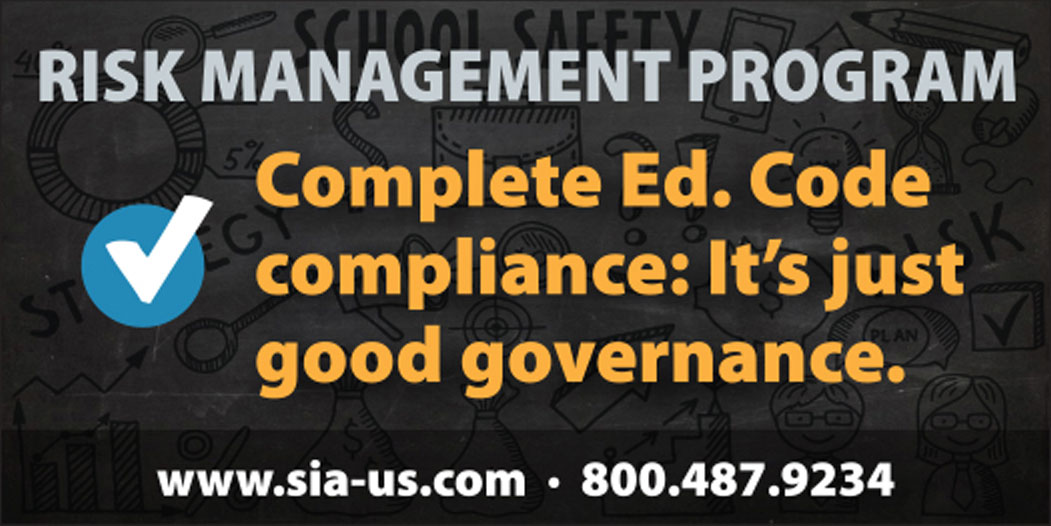

In an April 24 letter from CSBA CEO & Executive Director Vernon M. Billy to Gov. Gavin Newsom, Billy makes the case that California schools need additional funding and flexibility. Specifically, CSBA requests the Governor:


Meanwhile, the state and federal government have continued to roll out guidance related to graduation requirements, funding sources and labor management. Looking forward, Gov. Gavin Newsom said in an April 14 press conference that schools might operate much differently than usual when they resume. Among the six indicators that Gov. Newsom announced officials will consider before modifying the state’s stay-at-home order is “the ability for businesses, schools and child care facilities to support physical distancing.”

Chief Information Officer:
Troy Flint | tflint@csba.org
Managing Editor:
Kimberly Sellery | ksellery@csba.org
Marketing Director:
Serina Pruitt | spruitt@csba.org
Staff Writers and Contributors:
Andrew Cummins | acummins@csba.org
Alisha Kirby | akirby@csba.org
Aaron Davis | adavis@csba.org
Mike Ambrose | mambrose@csba.org
Briana Mullen | bmullen@csba.org
Graphic Design Manager:
Kerry Macklin | kmacklin@csba.org
Senior Graphic Designer:
Mauricio Miranda | mmiranda@csba.org
Xilonin Cruz-Gonzalez | Azusa USD
President-elect:
Suzanne Kitchens | Pleasant Valley SD
Vice President:
Susan Heredia | Natomas USD
Immediate Past President:
Emma Turner | La Mesa-Spring Valley SD
CEO & Executive Director:
Vernon M. Billy
California School News (ISSN 1091-1715) is published 11 times per year by the California School Boards Association, Inc., 3251 Beacon Blvd., West Sacramento, CA 95691. 916-371-4691. $4 of CSBA annual membership dues is for the subscription to California School News. The subscription rate for each CSBA nonmember is $35. Periodicals postage paid at West Sacramento, CA and at additional mailing office. POSTMASTER: Send address changes to California School News, 3251 Beacon Blvd., West Sacramento, CA 95691.
News and feature items submitted for publication are edited for style and space as necessary.


In this space last month, I commended the tireless work of trustees, administrators, teachers, classified staff and others for truly rising to the challenge and finding creative ways to teach and serve students on a massive scale and in relatively short order. And while much of the focus has been appropriately placed on the need for distance learning, what deserves equal attention is whether schools and their students have the resources to implement distance learning effectively and equitably. According to CSBA’s latest COVID-19 survey, other education organization research and a wide-ranging collection of recent news articles, the answer is no.
This unprecedented instructional shift forced by the COVID-19 pandemic is now shining the brightest spotlight yet on California’s long-standing digital divide, which undermines the academic, career and life prospects of students as well as the state’s economic potential. Particularly, students in low-income and rural communities frequently lack access to computers and broadband internet, making it difficult for schools to provide instruction in an equitable manner. To put it simply, many students lack access to technology when they need it most.
The opportunity for members of the public to address the governing board during board meetings is an essential and legally required part of school district governance. Members of the public may speak to any item on the agenda before or during consideration of the item, including closed session and consent items, and to items not on the agenda but within the subject matter jurisdiction of the board. In special meetings, which include emergency meetings, members of the public are able to address the board only regarding agenda items.
Boards are authorized to provide reasonable limits on the amount of time allocated for public testimony on a particular issue and for each individual speaker. Optional language in CSBA’s sample Board Bylaw 9323 – Meeting Conduct designates three minutes per speaker and 20 minutes per agenda or non-agenda item. Such reasonable regulation must ensure that the intent of allowing the public an adequate opportunity to speak to the board is carried out. Thus, while boards may provide general guidance about the total amount of time permitted per issue and speaker, circumstances may necessitate adjustments in order to provide full opportunity for public input.
Kicking off the series April 27 with an examination of state and federal guidance related to COVID-19, CSBA experts provided attendees with an overview of grading, testing, child care and emergency federal funding, as well as waivers granted thus far. Most importantly, panelists explained how all these changes impact LEAs and the role of district and county office governance teams.

The barreling economic downturn caused by COVID-19 upends most if not all the initial January 2020–21 state budget proposal and creates a bleak outlook for the pending May Revision.

The plaintiff argued on appeal before the Ninth Circuit that the district court should not have granted Clovis USD’s motion to dismiss, arguing that she was not required to exhaust administrative remedies before bringing her Section 504 and ADA claims in federal court; that settlement of IDEA claims should satisfy administrative exhaustion for purposes of both IDEA appeals, and Section 504 and ADA claims; and that failure to exhaust could not be raised until the summary judgment stage of the case, after the potentially lengthy and costly discovery of evidence has been completed. A ruling in favor of the plaintiff could have significantly increased the time and effort involved in litigation, as well as future litigation costs, for school districts in similar cases, so CSBA and its Education Legal Alliance filed an amicus brief before the Ninth Circuit in support of the district.
![]() GovernanceCorner Practical tips from our MIG faculty
GovernanceCorner Practical tips from our MIG faculty
Now, amid school closures caused by COVID-19 and the important work being done to support students every day, under extraordinary circumstances, it is more important than ever to honor these employees.
“The work accomplished by our educators and classified staff and the passion they have for improving children’s lives is incredible even under normal circumstances,” said CSBA CEO & Executive Director Vernon M. Billy. “If there is one thing this pandemic has shone a spotlight on, it is the deep commitment that California’s school employees have to their students. It is an honor to celebrate these heroes who regularly go above and beyond what it expected of them.”
E-rate provides discounts of up to 90 percent to help eligible schools and libraries in the United States obtain affordable telecommunications and internet access. The program is intended to ensure that schools and libraries have access to affordable telecommunications and information services.
On April 1, officials from the FCC’s Wireline Competition Bureau announced that it was extending the service delivery deadline for non-recurring services for funding year 2019 by one year — from Sept. 30, 2020, to Sept. 30, 2021. The latest order also grants schools and libraries an automatic 60-day extension to file requests for review or waiver of decisions by the E-Rate program administrator, the Universal Service Administrative Company and provides applicants and service providers an automatic 120-day extension of the invoice filing deadline. Additionally, all program participants are granted a 30-day extension to respond to certain information requests from USAC.
OAH is a neutral state agency that helps solve disagreements between individuals and government agencies. The Special Education Division of OAH handles mediations, prehearing conferences and due process hearings that involve issues related to special education under the Individuals with Disabilities Education Act.
The poll also confirms that the pandemic crisis is exacerbating persistent education equity issues, including inequitable access to technology, academic support, and resources for students of color and students from lower-income and rural communities.
“Students are experiencing new and ongoing trauma without the daily support of their teachers, their peers and other staff. Now more than ever, it is imperative that we reach out to our students to ensure their safety, and to determine what their needs are so that we can connect with them and connect them to appropriate resources,” Jackson said.
Elsewhere, the California Department of Education said it will seek the cancellation of the 2020 California School Dashboard and outlined how that would affect the key cog in the state’s accountability and assessment system.
The San Diego County Office of Education partnered with San Diego County District Attorney Summer Stephan to send a letter to the region’s educators on reporting during this time. The letter included a request that educators make an extra effort to reach out to children who:





